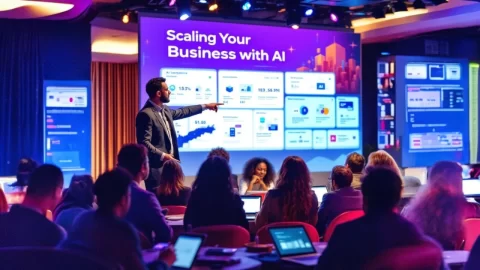In a rapidly shifting world where consumers, entrepreneurs, and stakeholders are demanding more transparency and ethical responsibility, traditional business models are evolving. The new economy is not just about maximizing profit—it’s about maximizing impact. Conscious business models are leading this change, prioritizing purpose, sustainability, and collective well-being alongside profitability.
This article explores how conscious entrepreneurs are designing businesses that thrive financially and make a meaningful difference. These models are the blueprint for the future—where purpose is profitable, and values shape strategy.
What Is a Conscious Business Model?
A conscious business model is a strategic framework built to:
- Create value for all stakeholders (not just shareholders)
- Prioritize ethical practices, sustainability, and social impact
- Foster a culture of transparency, trust, and human-centered leadership
Unlike traditional models, conscious businesses measure success beyond financial returns. They ask: How are we contributing to a better world?
Why the New Economy Demands Conscious Business
The rise of the new economy is shaped by:
- Conscious consumers who vote with their dollars
- Millennial and Gen Z workforces that value meaning over money
- Global crises exposing the flaws of extractive capitalism
Businesses that ignore this shift risk becoming irrelevant. Conscious models, on the other hand, are proving to be more resilient, innovative, and beloved by their communities.
The Triple Bottom Line Approach
One of the most foundational conscious frameworks is the Triple Bottom Line (TBL):
- People: Ensuring employee well-being, diversity, and fair labor
- Planet: Reducing environmental impact, using sustainable resources
- Profit: Creating financial value in alignment with purpose
This approach ensures that a business grows holistically, not just economically.
Stakeholder Capitalism Over Shareholder Capitalism
Traditional models put shareholders first. Conscious models elevate stakeholder capitalism, which considers the needs of:
- Employees
- Customers
- Suppliers
- Communities
- The environment
This shift from extraction to collaboration and mutual benefit creates long-term trust and loyalty.
Regenerative Business Practices
While sustainability aims to “do less harm,” regenerative business goes further: it restores and replenishes ecosystems and communities.
Core Elements of Regenerative Models:
- Circular production systems
- Local sourcing and community partnerships
- Giving more than they take
Regeneration is fast becoming the gold standard for ethical entrepreneurship.
B Corporations and Certifications
Conscious businesses often pursue third-party certifications to hold themselves accountable:
- B Corp Certification: Demonstrates high social and environmental performance
- Fair Trade: Ensures ethical sourcing and wages
- 1% for the Planet: Commits 1% of revenue to environmental causes
These designations are not marketing gimmicks—they reflect deep values and operational integrity.
Holistic Leadership and Conscious Culture
Business success in the new economy is deeply tied to leadership. Conscious leaders:
- Prioritize emotional intelligence, empathy, and authenticity
- Build inclusive, transparent, and purpose-driven cultures
- Value the whole human, not just job performance
These cultures fuel innovation, reduce burnout, and retain top talent.
Technology for Good
Technology is a powerful force in conscious business. But it must be used ethically.
Conscious Tech Strategies:
- Designing for accessibility and inclusion
- Protecting data and privacy
- Reducing digital harm and screen fatigue
When used responsibly, technology amplifies purpose and reaches wider audiences.
Business as a Vehicle for Social Change
Conscious businesses often integrate impact directly into their revenue model. Examples include:
- Buy-one-give-one models (e.g., TOMS Shoes)
- Direct-to-consumer with purpose-driven storytelling
- Social enterprises reinvesting profits into community programs
Profit becomes a tool for creating systemic change, not just personal gain.
Embracing the Circular Economy
Linear models (take, make, waste) are being replaced by circular economies that:
- Design out waste
- Keep materials in use
- Regenerate natural systems
This model boosts innovation, reduces costs, and aligns with ecological intelligence.
Real-World Examples of Conscious Businesses
- Patagonia: Pioneering environmental activism while remaining profitable
- Seventh Generation: Creating eco-friendly products with full transparency
- Ben & Jerry’s: Advocating for social justice alongside selling ice cream
These businesses prove that ethics and excellence are not mutually exclusive.
FAQs: Conscious Business Models
What is the main goal of a conscious business model?
To align profit with purpose, serving people and the planet while remaining financially viable.
Can a conscious business still be competitive?
Yes. In fact, purpose-driven brands often enjoy stronger loyalty, media attention, and long-term profitability.
Is being a B Corp necessary?
Not required, but helpful. Certifications signal credibility and accountability to conscious consumers.
How do you start building a conscious business?
Start with your “why,” define your impact metrics, and embed values into every operational layer.
Are conscious businesses only for small startups?
No. Companies of all sizes, including corporations, are embracing this shift.
Conclusion: Conscious Models Are the Future of Business
As the new economy continues to evolve, conscious business models will become the norm, not the niche. Entrepreneurs who lead with heart, prioritize humanity, and think systemically will not only build wealth but also reshape the world.
If you’re an entrepreneur, founder, or leader, now is the time to align your strategy with your soul. The businesses that thrive in this new era will be those that create profit with purpose, growth with grace, and success with significance.
Internal Link: Explore how purpose-driven leadership fuels long-term success in this article.
External Link: Learn more about B Corp certification from Bcorporation.net.
The new economy isn’t just coming—it’s here. Will your business rise with it or be left behind? Choose conscious.






